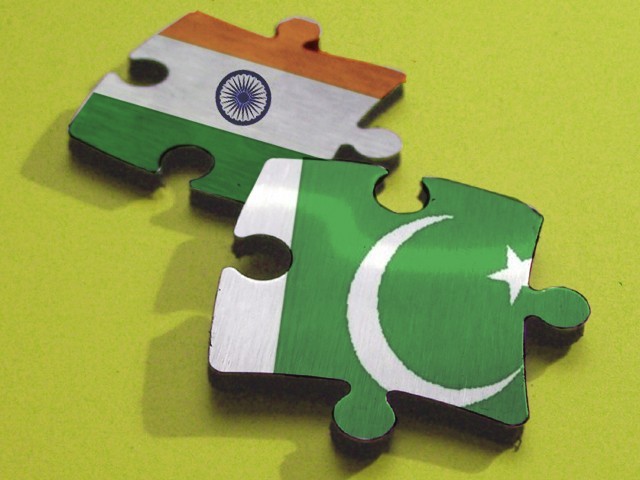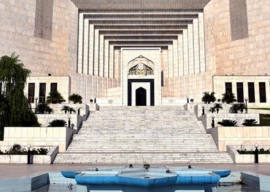
By snubbing Nawaz Sharif’s invitation to be part of his swearing in, the Indian prime minister hardly surprised anybody.
War lobbies in both India and Pakistan continuously focus on the issues that prevent reconciliation, and the media happily stokes differences.
A recent appearance in a live debate on one of the prime Indian channels made me wonder whether such militant attitudes can help in peace-building at all?
Arnab Goswami, the host of the one of Times Now’s popular talk shows, came across as somebody bent upon demolishing the offer that Nawaz made two days after his election victory.
“Why should we or can we trust Sharif? Will Sharif have real power or just be a puppet in the hands of the military establishment?”
These were some of the questions Goswami premised his entire programme on, including flashbacks to the Kargil episode. Despite some positive comments by the four Indian and three Pakistani panelists, the anchor refused to budge, repeatedly bringing up the issue of Kargil and trust.
“Why and how should we trust Sharif, and for that matter Pakistan?” was his refrain.
This non-professional, hawkish and haranguing anchoring went on for almost 35 minutes.
Frustrated, and sensing there was little I could contribute to this rabidly negative debate, I unplugged the microphone and walked out of the programme while cameras still rolled in the Islamabad studio - something I never had done before in my entire professional career.
And although the programme producer begged me to return to my seat, I refused saying that Arnab was not doing a professional tv programme and instead projecting a certain lobby’s view point. Thus there was little point in being part of this cacophony in the name of journalism.
This particular episode also reminded me of a recent meeting with the president of the Australian upper house of Parliament – the Senate.
“Standards of journalism have declined and the 24/7 cycle of news has virtually destroyed objectivity and fairness. It also has undermined reporters’ capacity to report objectively,” remarked Senator John Hogg, during a meeting with journalists from Pakistan.
He made those remarks to the context of a media ombudsman bill that the Australian ruling party had proposed but eventually had to shelf.
While the ruling party, led by Premier Juila Gillard, had deemed the bill necessary for bringing discipline to the media, detractors called it a draconian law aimed at circumscribing media freedom. The outcry forced Gillard to abandon the move.
But Senator Hogg had a point in characterising attitudes within the media. And, interestingly, it fits the Pak-India political and media landscape as well.
The media on both sides of the border is always on the prowl for news that can stoke emotions or kick off new controversies. They live and thrive off a contentious style of reporting and analysis, at the cost of established journalistic norms that are fast fading in the face of the quest for breaking news and ratings.
Shoddy news reporting, driven by the 24/7 cycle and commercial considerations, clearly obstructs or at least blurs the vision of politicians who usually are already handicapped by domestic socio-political pressures.
In this context, the media assumes the role of a conflict-stoker, instead of peace-promoter. Rather than building on available ingredients of peace and trust, media – anchors, reporters and analyst-anchors –keep digging into past acrimonies, and inadvertently inject poison into public minds, thereby vitiating the atmosphere for political leaderships.
While political parties need to refrain from deploying media to their advantage, big media houses also require balancing their commercial compulsions with the larger public interest, which they undertake to safeguard while establishing their ventures.
In the words of Senator Hogg, “the media is not a law onto itself ... while they demand responsibility and accountability of the government, they must subject themselves to the principles of accountability and responsibility.”
Published in The Express Tribune, May 23rd, 2013.
COMMENTS (13)
Comments are moderated and generally will be posted if they are on-topic and not abusive.
For more information, please see our Comments FAQ

















While I do agree with Mr. Gul about the rabidness of programmes conducted by Arnab Goswami, I do see the questions as being quite legitimate in any debate. It seems to me that most Pakistani analysts seem to be oblivious of the deeps scars that the Mumbai terrorist incidents have left on the Indian Psyche. Add to that the deliberate nonchalance that Pakistani establishment has displayed to investigating the incident and bringing the perpetrators to book, and you can realize the doubts that most Indians are quite justified to express regarding fresh promises. All these Pakistani analysts would do a great service to their country, if they were to question their establishment as to what they are doing to bring those responsible for 26/11, inside Pakistan to book. Having said that, there is no alternative to India-Pakistan peace efforts and they must continue, even if they are in fits and starts. Something is certainly better than nothing in this case.
@Hurts: Its a two sided story dear.
Why is your world so perfect ?
All Pakistanis also want to know if India can be trusted ?
And you know what , mere replies and the Great Clean-sheet India claims are not the answer to t his question.
Can both sides trust each other , thats a question only time will answer to both sides.
NO ONE IS INNOCENT.
dear friends, international relations, or bilateral relations are never constant. They keep evolving despite fundamental irritants. Nations move on engaging on the bare minimum convergences and that happens only when both sides agree to move on rather than remain frozen in decades old positions. So let us shun skepticism, pessimism and hope that May 11, 2013 elections have thrown up a different Pakistan and that its new rulers, driven by social, political and economic compulsions, mean business. Simple!
India Pakistan needs more trust than anything else. As we know that a person is as good as his last deeds and Mr Nawaj Sharif is known for Lahore agreement and not Kargil (that credit goes to Mr Musharraf). Moreover if you think Sharif as corroborator then prove it and without proving he is as innocent as anybody else. So why him make the subject of ridicule when he again again proclaiming that he was totally ignorant. We can not live without peace and we can not also change neighbors then we do not any other choice but to go for peace and to achieve that we should always search for newer opportunities and innovative ideas. MMS's journey could have been totally person what would have been the problem in that?
@Mr.Gul
Truth hurts . And that's why you should be in a position to answer all bitter questions .That is the job of journalists . It was not the question of Arnab , It was the question of all Indians ? In fact the question should be "can Pakistan be trusted (in stead of Mr. Sharif) after four wars and all these historic events ?".
Paksitani media is projects negative image of India? Whole day tributes to bollywood actors? full coverage to thier movies and culture? is that anti india?
Recent Kashmir border issue, what did Paksitani media project apart from hiding the issues? Whereas at the same time the indian media was going crazy about it (Najam Sethi,very pro indian, even admitted in his program aapis ki baat).
Yes there are a few in Pakistan that do propaganda, but its nothing compared to rest and most of the media that hides the issues and promote indian culture.
And i must say its about time out media should get loyal to Pakistan
@Indian: Thanks. We need more people from your side to make your side understand this.
@Jat: Even for the sake of argument, your question is meaningless. Nawaz Sharif is going to be the next Prime Minister of Pakistan, and your question is going to have no bearing on that. You'll have to deal with him anyway regardless of that question mattering or not. So it's better to get over your conflicting policies and move forward.
Mr. Gul, I've always enjoyed reading your articles. My first thought when the invitation came from NS was that MMS should go, it would have cemented the relationship, if not with Pakistan but at least between the two leaders. Then I read about Gen. Kiyani's meeting with NS and his advice on India, apart from other things. So let's wait for a while and see how things develop. A bad, under-prepared summit meeting is much worse than having no summit.
@Jat: I think trust is a big word just start fresh from hello.Do v have any other option i dont think so.We need to talk and same time need to sit on top of kargil with eyes wide open.power always rest with.powerful but order comes.from.the king.Arnav goswami is hawkish jurno.In his programs he speaks more then his guests ,has more views and i dont know why he invite guests.But i like him the ways he rip thru corrupt politcians and admin.Some of them fear him.so.much they dont even come on his shows.
@Asif Butt: Excellent comment.
Mr Gul, you are one of the more sensible and genuine commentators in the Pakistan media, and I always make it a point to ready your articles. Please do me a favor, and answer Arnab's three questions despite his "unprofessional" behavior.
“Why should we or can we trust Sharif? Will Sharif have real power or just be a puppet in the hands of the military establishment?”
Once we have the answers, we can proceed from there and hopefully make some real progress.